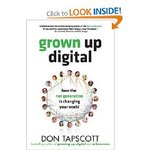An opportunity for HR in 2009
Ok, you are probably sick of reading blogs, analyst opinions, and watching Webinars that all keep saying the same thing: in 2009 there are opportunities for HR Technologists to make substantial impact deploying systems or platforms to improve collaboration, networking, and information sharing.
Take a look at this quote from the Collaborative Thinking blog by Mike Gotta:
An opportunity for HR in 2009
Generational shifts: GenY and aging workforce trends create opportunities for HR groups to take on a much more strategic role. Employee, retiree and alumni social networks for instance have the potential to help organizations become more resilient and agile by allowing it to capitalize on its internal and extended relationships - often in ways not constrained by formal institutional structures
How about this one from the Aberdeen Group's Kevin Martin:
While HR and IT can often butt heads regarding HR systems implementations, Aberdeen's research has uncovered that HR should collaborate with IT to advance Web 2.0 initiatives and achieve the above-referenced common organizational objective: organizational knowledge capture and transfer.
And if you come to the realization and conclusion that social networking and collaboration technologies are the right tools for your organization and want to champion their adoption and deployment but are faced with skeptical or less-informed management? How do you convince the 'old-guard' managers and influencers that social technologies are a valuable, soon to be essential tool, and not just a distraction from 'real work'? How about this answer from Knowledge Infusion:
Don't try. Start at grassroots level with a ripe and receptive department or business unit. Once there is success and viral effect, the old school executives will take notice and support an enterprise approach.
You know, deep down you know, that jumping in to the Web 2.0 world is the right thing to do in 2009. The start-up investment is extremely low, the learning curves are short, and there are loads of articles, blogs, case studies describing how numerous organizations have approached and have had success with these tools.
Don't wait for the jokers in IT to do this and grab all the glory a year from now!

 Steve
Steve



